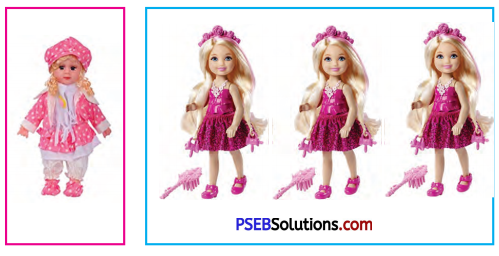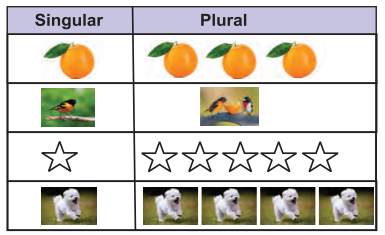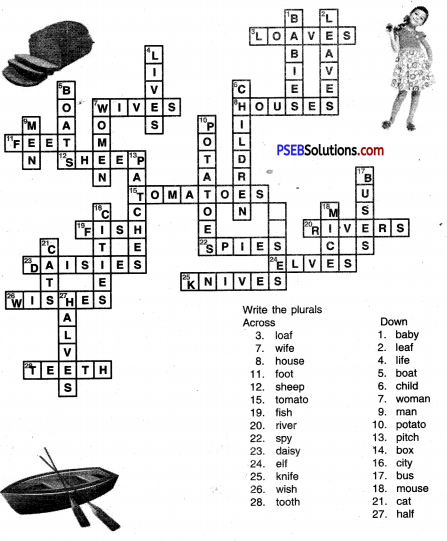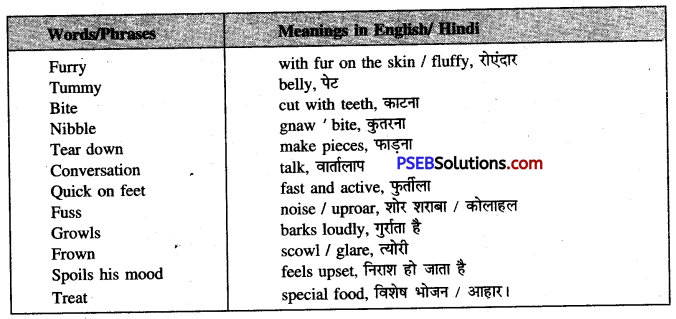Punjab State Board PSEB 6th Class English Book Solutions Poem 1 My Furry Friend Textbook Exercise Questions and Answers.
Class 6th English Solutions Poem Chapter 1 My Furry Friend Question Answers
My Furry Friend Class 6 Questions and Answers
Activity 1.
Look up the following words in a dictionary. You should seek the following information about the words and put them in your WORDS notebook.
1. Meaning of the word as used in the Lesson (Adjective/Noun/Verb, etc.)
2. Pronunciation (The teacher may refer to the dictionary or the mobile phone for correct pronunciation.)
3. Spellings
| tummy | nibbles | tear down | conversation | quick on feet |
| fuss | growls | frown | treat |
![]()
Vocabulary Expansion
Activity 2.
Give the rhyming words of the following words :

Activity 3.
Read the following words/phrases and use them in meaningful sentences :
1. conversation : I was listening to their funny conversation.
2. frown : A frown on her face shows that she is angry.
3. tear down : The baby girl torn down her doll.
4. quick on feet : My servant is very quick on his feet.
Learning to Read and Comprehend
Activity 4.
Read the poem and answer the following question :
Write a few things about the furry friend of the poet.
Answer:
1. The furry friend of the poet is a little puppy.
2. He is black and white.
3. He sleeps day and night.
4. His tummy is very fat.
5. His eyes are soft brown.
Activity 5.
Read and answer :
1. I brought home a puppy
He looked very happy!
Q. What did the poet bring home ?
कवि घर में क्या लाया ?
Answer:
The poet brought a puppy home.
2. Nibbles like a mouse
Eats whatever he finds in the house.
Q. What does the puppy nibble at ?
पिल्ला क्या कुतरता/चबाता है ?
Answer:
The puppy nibbles at whatever he finds in the house.
![]()
3. You ask him to go
he growls loudly to say NO.
Q. Why does the puppy growl ?
पिल्ला क्यों गुर्राता है?
Answer:
The puppy growls to say ‘No’ to go.
4. He is quick on his feet
When you give him a treat.
Q. When is the puppy quick on his feet ?
पिल्ला तेजी कृब दिखाता है ?
Answer:
The puppy is quick on his feet when you give him a treat. (विशेष भोजन)
Learning Language
The Noun-Number
Study the following words in the table :
| Singular Noun (one) | Plural Noun (many) |
| doll | dolls |
| bat | bats |
| baby | babies |
| city | cities |
| orange | oranges |

Now let us look at the following sentences :
1. Radhika has one doll. Rita has three dolls.
2. Amrit got two chocolates on his birthday.
3. I have an orange in my bag.
Nouns Singular भी हो सकते हैं Plural भी। किसी एक वस्तु को व्यक्त करने वाले Nouns Singular तथा एक से अधिक वस्तुओं का बोध कराने वाले Nouns Plural होते हैं।
![]()
Examples :
1. one orange, three oranges
2. one bird, two birds
3. one star, many stars
4. one puppy, four puppies

Making Plural
Singular Nouns से Plural बनाने के कई नियम हैं। मुख्य रूप से हम Singular के साथ ‘-s’, ‘-es’ या ‘-ies’ जोड़ते हैं। कई अन्य नियम भी हैं। इन सबका अध्ययन कीजिए
To make plural from singular we add ‘-s’, ‘-es’, ‘-ies’. Also, -becomes ‘-ves’ (self-selves, knife-knives). Some nouns remain the same in their plural form too. For example : sheep, fish, deer.
Let us look at some examples :
(i) By adding ‘s’
| Singular | Plural | Singular | Plural |
| cat | cats | ball | balls |
| flag | flags | lion | lions |
| horse | horses | sister | sisters |
| goat | goats | owl | owls |
(ii) Nouns ending in -S, -X, -sh, -ch, take “-es’ after them.
| bunch | bunches | brush | brushes |
| dish | dishes | bush | bushes |
| tax | taxes | box | boxes |
| dress | dresses | class | classes |
(iii) Nouns ending in -y with a consonant letter before it take-ies’ after replacing ‘y’.
| city | cities | baby | babies |
| story | stories | lady | ladies |
| family | families | sky | skies |
| puppy | puppies | country | countries |
![]()
(iv) Nouns ending in -y with a vowel letter before -y take only ‘-s’ after them.
| key | keys | storey | storeys |
| boy | boys | holiday | holidays |
| play | plays | monkey | monkeys |
| day | days | valley | valleys |
(v) Nouns ending in -f or -fe change by replacing -f, -fe with -ves.
| calf | calves | knife | knives |
| thief | thieves | half | halves |
Rule ( नियम) (v) का अपवाद
| roof | roofs | proof | proofs |
| chief | chiefs | hoof | hoofs |
(vi) Nouns ending in -o with a consonant before -o take ‘-es’ after them.
| echo | echoes | hero | heroes |
| potato | potatoes | mango | mangoes |
अपवाद photo—photos; piano—pianos (‘-s’ only).
(vii) Nouns ending in -o with a vowel letter before -o take ‘-s’ after them.
| radio | radios | bamboo | bamboos |
| cuckoo | cuckoos | video | videos |
(viii) Compound nouns change by taking ‘-s’ after the main noun.
| daughter-in-law | daughters-in-law | son-in-law | sons-in-law |
| step-daughter | step-daughters | step-son | step-sons |
(ix) Some irregular plurals (अनियमित रूप से बदलने वालो Nouns)
| man | men | woman | women |
| foot | feet | goose | geese |
| mouse | mice | child | children |
| ox | oxen | tooth | teeth |
| person | people | louse | lice |
![]()
(x) Some compound nouns take double plural. (दोनों भागों में change)
| man-servant | men-servants | woman-servant | women-servants |
(xi) Others – No change :
| fish | fish | deer | deer |
| cattle | cattle | dozen | dozen |
| sheep | sheep | furniture | furniture |
Activity 6.
Solve the crossword given below. You have to make plurals of the words given.
For example :
1 down is given – baby-babies :

Activity 7.
Make a list of action words used for the furry friend of the poet in the table given below.
| S.No. | Verbs |
| 1. | fights, loves, listens |
| 2. | bites, spoils, sleeps |
| 3. | nibbles, finds |
| 4: | eats |
| 5. | makes, comes, sits |
| 6. | tears, growls. |
Such words that show action are called Verbs.
क्रिया को व्यक्त करने वाले शब्द Verbs कहलाते हैं।
![]()
Comprehension Of Stanzas
Read stanzas given below and answer the questions that follow each :
(1) I brought home a puppy
He looked very happy!
Soft brown eyes !
Is very small in size
Black and white
Sleeps day and night
As small as a rat.
But has a tummy so fat !
1. What did the poet bring home ?
कवि घर में क्या लाया ?
2. What was his colour ?
इसका रंग क्या था ?
3. How were his eyes ?
इसकी आँखें कैसी थी?
4. What does the poet compare him with ?
कवि इसकी तुलना किससे करता है?
Or
Name the poem and the poet.
कविता तथा कवि का नाम बताओ।
Answer:
1. The poet brought home a small puppy.
2. His colour was black and white.
3. His eyes were soft brown.
4. The poet compares him with a mouse.
Or
The name of the poem is ‘My Furry Freind and that of the poet (poetess) is Vandana Lunyal.
(2) He makes a funny noise
When he tears down his toys
He loves to be part of the fun
And listens to our conversation.
He comes and sits between us.
And makes a fuss
You ask him to go
He growls loudly to say No.
1. When does the poet’s puppy make a funny noise ?
कवि का पिल्ला अजीब (मज़ेदार) शोर कब करता है?
2. What does he enjoy listening to ?
उसे क्या चीज़ सुनने में आनंद आता है?
3. Who makes a fuss ?
शोर – शराबा कौन करता है?
![]()
4. How does he behave to say “No’?
‘No’
Or
Write the rhyming words in the stanzas. Two or three pairs. दो या तीन जोड़े
Answer:
The poet’s puppy makes a funny noise when he tears his toys.
2. He enjoys listening to the conversation between the poet and his family.
3. The poet’s puppy makes a fuss.
4. He growls (Txfa) loudly to say ‘No’
Or
noise-toys; us—fuss ; gono.
Now fully grown His forehead has a frown If you touch his food He spoils his mood. He loves to eat
Answer:
1. The poet brought home a small puppy.
2. His colour was black and white.
3. His eyes were soft brown.
4. The poet compares him with a mouse.
Or
The name of the poem is ‘My Furry Freind and that of the poet (poetess) is Vandana Lunyal.
He makes a funny noise When he tears down his toys He loves to be part of the fun And listens to our conversation.
He comes and sits between us. And makes a fuss You ask him to go
He growls loudly to say No.
![]()
1. When does the poet’s puppy make a funny noise ?
कवि का पिल्ला अजीब (मज़ेदार) शोर कब करता है?
2. What does he enjoy listening to ?
उसे क्या चीज़ सुनने में आनंद आता है?
3. Who makes a fuss ?
शोर – शराबा कौन करता है।
4. How does he behave to say “No’?
‘No’ करने के लिए वह कैसा व्यवहार करता है।
Or
Write the rhyming words in the stanzas. Two or three pairs.
दो या तीन जोड़े
Answer:
1. The poet’s puppy makes a funny noise when he tears his toys.
2. He enjoys listening to the conversation between the poet and his family.
3. The poet’s puppy makes a fuss.
4. He growls (गुर्राता) loudly to say ‘No’
Or
noise – toys; us – fuss ; go – no.
(3) Now fully grown
His forehead has a frown
If you touch his food
He spoils his mood.
He loves to eat
Always hungry for meat
He is quick on his feet
When you give him a treat.
1. Name the poem and the poet.
कविता और कवि का नाम लिखें।
Write the words that rhyme together.
वे शब्द लिखें जिनकी लय एक जैसी है।
2. Who is now fully grown ?
अब पूरी तरह बड़ा कौन हो चुका है?
3. What does he love to eat most ?
वह सबसे ज्यादा क्या चीज़ खाना पसंद करता है?
4. What is his reaction when you give him a treat ?
विशेष आहार/खाना मिलने पर उसकी क्या प्रतिक्रिया होती है?
Answer:
The name of the poem is ‘My Furry Friend’ and the poet is Vandana Lunyal.
Or
grown – frown, food – mood, eat – meat, feet – treat.
2. The poet’s puppy is now fully grown.
3. He loves to eat meat most.
4. He is quick on his feet.
![]()
Word Meanings

My Furry Friend Poem Summary in English
My Furry Friend Summary in English
The poet brought a furry puppy in home. He was black and white in colour. His eyes were soft brown. He looked very happy and slept day and night. Though the puppy was small in size, his tummy was very fat. He nibbled at everything it found in the house.
He tore down his toys and made a funny noise. He enjoyed family talks and growled when he was asked to go away. Next he was fully grown and always looked angry. He would not allow you to touch his food. Meat was his favourite food. He was always hungry for it and ate it greedily.
![]()
My Furry Friend Summary in Hindi
कवि एक छोटा सा रोएंदार (फर वाला) पिल्ला घर ले आया। देखने में यह एक चूहे जितना लगता था। इसका रंग काला और सफेद था। इसकी हल्की-भूरी आंखें थीं और इसका पेट मोटा था। यह हर समय सोया रहता था और बहुत ही खुश दिखाई देता था।
पिल्ले की आदतें अजीब थीं और वह अजीब हरकतें करता था। वह चूहे की तरह चीज़ों को कुतरता था और उसे जो कुछ भी मिलता था खा जाता था। वह बहुत ही फुर्तीला था और हर समय लड़ने को तैयार रहता था। वह अपने खिलौने तोड़-फोड़ देता था और अजीब शोर करता था।
पिल्ले को कवि तथा परिवार की बातचीत सुनने में आनंद आता था। इसलिए वह उनके बीच आ बैठता था। भगाने पर भी वह नहीं जाता था और गुर्राने लगता था। अब पिल्ला कुत्ता बन चुका था और हर समय गुस्से में रहता था। वह खाने का बहुत शौकीन था और हर समय मांस खाने को मांगता था। जब भी उसे उसका मनपसंद खाना दिया जाता था, वह तेज़ी से उठ खड़ा होता था। उसके बाद वह अपने खाने को हाथ भी नहीं लगाने देता था।
Class 6th English Book Solutions PSEB Poetry
